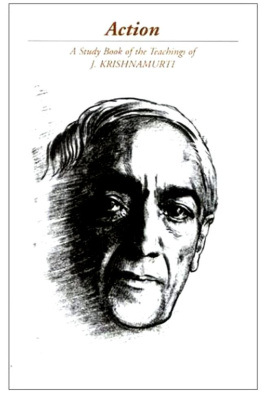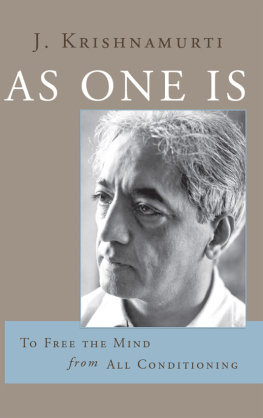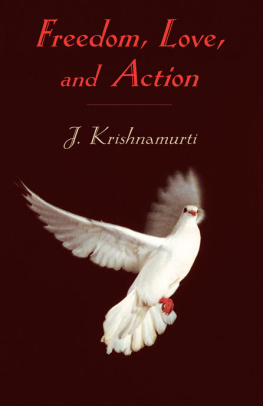Krishnamurti - Action
Here you can read online Krishnamurti - Action full text of the book (entire story) in english for free. Download pdf and epub, get meaning, cover and reviews about this ebook. publisher: Krishnamurti Foundation of America, genre: Religion. Description of the work, (preface) as well as reviews are available. Best literature library LitArk.com created for fans of good reading and offers a wide selection of genres:
Romance novel
Science fiction
Adventure
Detective
Science
History
Home and family
Prose
Art
Politics
Computer
Non-fiction
Religion
Business
Children
Humor
Choose a favorite category and find really read worthwhile books. Enjoy immersion in the world of imagination, feel the emotions of the characters or learn something new for yourself, make an fascinating discovery.
- Book:Action
- Author:
- Publisher:Krishnamurti Foundation of America
- Genre:
- Rating:5 / 5
- Favourites:Add to favourites
- Your mark:
- 100
- 1
- 2
- 3
- 4
- 5
Action: summary, description and annotation
We offer to read an annotation, description, summary or preface (depends on what the author of the book "Action" wrote himself). If you haven't found the necessary information about the book — write in the comments, we will try to find it.
Action — read online for free the complete book (whole text) full work
Below is the text of the book, divided by pages. System saving the place of the last page read, allows you to conveniently read the book "Action" online for free, without having to search again every time where you left off. Put a bookmark, and you can go to the page where you finished reading at any time.
Font size:
Interval:
Bookmark:
Action
A Selection of Passages
from the Teachings of
J. Krishnamurti

1990 by the Krishnamurti Foundation of America
Revised edition, 2000
Editor: Albion W. Patterson
ISBN 9781934989142
Publisher: Krishnamurti Publications of America
All rights reserved. Printed in the United States of America. No part of this book may be used or reproduced in any manner whatsoever without written permission except in the case of brief quotations embodied in critical articles and reviews. For information and a complete catalogue of Krishnamurti books, videotapes, and audio tapes write:
Krishnamurti Foundation of America
P.O. Box 1560, Ojai, California 93024
U.S.A.
www.kfa.org
Foreword
The passages in this Study Book have been taken directly from Krishnamurti's talks and books from 1933 through 1967. The compilers began by reading all the passages from this period which contained the word action the theme of this book. This would not have been possible without the use of a full text computer database, produced by the Krishnamurti Foundation Trust of England. Over 750 passages were studied in all, and the aspects of "action" most frequently addressed by Krishnamurti were noted. These aspects then formed the outline for the contents of this book.
The material selected has not been altered from the way it was originally printed except for limited correction of spelling, punctuation, and missing words. Words or phrases that appear in brackets are not Krishnamurti's, but have been added by the compilers for the sake of clarity. Ellipses introducing a passage, or ending it, indicate that the passage begins or ends in mid-sentence. Ellipses in the course of a passage indicate words or sentences omitted. A series of asterisks between paragraphs shows that there are paragraphs from that talk which have been omitted. Captions, set off from the body of the text, have been used with many passages. Most captions are statements taken directly from the text, with some being a combination of phrases from the passage.
Krishnamurti spoke from such a large perspective that his entire vision was implied in any extended passage. If one wishes to see how a statement flows out of his whole discourse, one can find the full context from the references at the foot of each passage. These refer primarily to talks which have been published in The Collected Works of J. Krishnamurti . This seventeen-volume set covers the entire period from which this study book has been drawn. A complete bibliography is included at the end of this book. Students and scholars may also be interested in additional passages on action not used in the book, available for study upon written request, in the archives of the Krishnamurti Foundation of America.
This Study Book aims to give the reader as comprehensive a view as possible, in 140 pages, of the question of action as explored by Krishnamurti during the period covered. Most of the material presented has not been previously published, except in the Verbatim Reports which were produced privately, in limited numbers, primarily for those who attended Krishnamurti's talks.
A final note: The term heuristic , used in the heading of section VI, is defined by the Chambers Twentieth Century Dictionary as "serving or leading to find out" or "the method in education by which the pupil is set to find out things for himself" and not "depending on assumptions based on past experience."
Albion W. Patterson, Editor
Chambers Twentieth Century Dictionary, New Edition, Edinburgh, Chambers, 1972, p. 612
Introduction
Talking things over together as two friends...
In a few days we are going to have discussions, and we can start those discussions this morning. But if you assert and I assert, if you stick to your opinion, to your dogma, to your experience, to your knowledge, and I stick to mine, then there can be no real discussion because neither of us is free to inquire. To discuss is not to share our experiences with each other. There is no sharing at all; there is only the beauty of truth, which neither you nor I can possess. It is simply there.
To discuss intelligently, there must also be a quality not only of affection but of hesitation. You know, unless you hesitate, you can't inquire. Inquiry means hesitating, finding out for yourself, discovering step by step; and when you do that, then you need not follow anybody, you need not ask for correction or for confirmation of your discovery. But all this demands a great deal of intelligence and sensitivity.
By saying that, I hope I have not stopped you from asking questions! You know, this is like talking things over together as two friends. We are neither asserting nor seeking to dominate each other, but each is talking easily, affably, in an atmosphere of friendly companionship, trying to discover. And in that state of mind we do discover, but I assure you, what we discover has very little importance. The important thing is to discover, and after discovering, to keep going. It is detrimental to stay with what you have discovered, for then your mind is closed, finished. But if you die to what you have discovered the moment you have discovered it, then you can flow like the stream, like a river that has an abundance of water.
Saanen, 10th Public Talk, August 1, 1965 Collected Works , Vol. XV, p. 245
I. An Overview
In learning there is no end and that is the beautythe sacredness of life.
So you and I will go into this together. You are not going to learn anything from me, you are not going to gather something here and go away with it, because if you do that, it will be merely an accumulation, something which you store up to remember. But as I am talking, please listen with your whole being, with your full attention, with eagerness, as you would listen to something which you really loveif you ever do love. Because here you are receiving no instructions and you are not a pupil. You are learning an artand I really do mean that. We are learning together and therefore the division of the teacher and the disciple has completely gone. It is immature thinking to regard somebody as a teacher who knows and yourself as one who does not know. In that relationship both lack humility and therefore both cease to learn. This is not just a verbal expression, a temporary statement, as you will see for yourself if you listen without merely looking for instructions as to what to do and what not to do. Life is not understood through a series of instructions. You can apply instructions to a dynamo, the radio, but life is not a machine, it is an everliving, ever-renewing thing. So, there is no instructionand that is the beauty of learning. The mind that is small, instructed, taught, only strengthens memoryas happens in all the universities and schools where you merely cultivate memory in order to pass examinations and get a job. That is not acquiring intelligence. Intelligence comes when you are learning. In learning there is no end, and that is the beauty of life, the sacredness of life. So you and I are going to learn, to explore, think together and communicate with each other about action.
To most of us life is action, and by action we mean something which has been done, is being done, or will be done. Without action you cannot live. Action does not mean only physical movement, going from here to there; there is also the action of thought, the action of an idea, the action of a feeling, of environment, of opinion, the action of ambition, of food and of psychological influencesof which most of us are totally unaware. There are the actions of the conscious mind and the actions of the unconscious mind. There is also, is there not, the action of a seed in the earth, the action of a man who gets a job and sticks to it for the rest of his life; there is the action of the waves beating on the shore, the action of gentle weather, of rain; there is all the action of the earth and of the heavens. So action is something limitless. Action is a movement both within and out of time. I am thinking aloud with you; I am exploring. I came here with one thought, action, and I want to discuss it with you, go into it, explore it gently, slowly, quietly, so that you and I understand it together.
Next pageFont size:
Interval:
Bookmark:
Similar books «Action»
Look at similar books to Action. We have selected literature similar in name and meaning in the hope of providing readers with more options to find new, interesting, not yet read works.
Discussion, reviews of the book Action and just readers' own opinions. Leave your comments, write what you think about the work, its meaning or the main characters. Specify what exactly you liked and what you didn't like, and why you think so.









